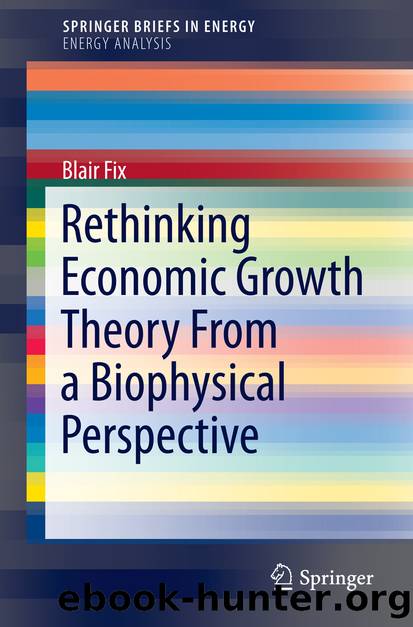Rethinking Economic Growth Theory From a Biophysical Perspective by Blair Fix

Author:Blair Fix
Language: eng
Format: epub
Publisher: Springer International Publishing, Cham
Reviewing the empirical evidence presented in this chapter, it is easy to see why policymakers and economists focused on growth and not on distribution. It is because growth eased distributional issues. Summarizing our findings, we can state that increases in the useful work growth rate are related to:1.Increases in profit’s share of national income.
2.The increased ability of debtors (both public and private) to repay creditors.
3.Decreases in income inequality.
At the turn of the twenty-first century, distributional issues are once again of central interest to economists and policymakers alike. For instance, Thomas Piketty’s (2014) book on income inequality has become an unlikely New York Times best seller. The evidence presented in this chapter suggests that distribution and growth are inherently connected—distributional issues are magnified when biophysical growth stagnates. Biophysical scholars have long predicted that peak oil would spell the end of growth (Hubbert 1993; Heinberg 2011; Murphy and Hall 2011). With global oil production currently in a plateau, we should not be surprised that distributional issues are once again at the forefront of public interest.
As stated at the outset of the book, complexity poses a major problem for science. Without a certain amount of idealization, science is impossible. Simplify too far, however, the scientific theory will be of little use. Removing the real-world complexities of economic distribution greatly simplifies the process of explaining growth. Yet, the evidence suggests that this simplification is misguided: the complex business of distribution seems to be inherently connected to biophysical growth. As such, the neoclassical assumption that distribution is unrelated to growth is insidiously untrue.
From a Darwinian perspective, the control of resources is one of the major drivers of reproductive success. Although we should not reduce this to social Darwinism, it is naive to think that humans are somehow separate from an otherwise universal resource struggle. From the evidence presented here, it is clear that the growth of energy consumption dampens the distributive struggle. After all, the easiest way to reduce the competition for resources is to increase the resource “pie”. This effectively makes the game “positive sum”: there are relative winners and losers, but overall, everyone wins. Yet the peak and decline of energy production threatens to make the game “negative sum”: there will be relative winners and losers, but overall, everyone loses. Thus, while predictions are difficult to make, a future decline in energy consumption will almost certainly exacerbate existing distributional problems.
Download
This site does not store any files on its server. We only index and link to content provided by other sites. Please contact the content providers to delete copyright contents if any and email us, we'll remove relevant links or contents immediately.
International Integration of the Brazilian Economy by Elias C. Grivoyannis(108505)
The Radium Girls by Kate Moore(12012)
Turbulence by E. J. Noyes(8040)
Nudge - Improving Decisions about Health, Wealth, and Happiness by Thaler Sunstein(7689)
The Black Swan by Nassim Nicholas Taleb(7101)
Rich Dad Poor Dad by Robert T. Kiyosaki(6600)
Pioneering Portfolio Management by David F. Swensen(6281)
Man-made Catastrophes and Risk Information Concealment by Dmitry Chernov & Didier Sornette(6001)
Zero to One by Peter Thiel(5782)
Secrecy World by Jake Bernstein(4738)
Millionaire: The Philanderer, Gambler, and Duelist Who Invented Modern Finance by Janet Gleeson(4461)
The Age of Surveillance Capitalism by Shoshana Zuboff(4273)
Skin in the Game by Nassim Nicholas Taleb(4233)
The Money Culture by Michael Lewis(4190)
Bullshit Jobs by David Graeber(4177)
Skin in the Game: Hidden Asymmetries in Daily Life by Nassim Nicholas Taleb(3986)
The Dhandho Investor by Mohnish Pabrai(3757)
The Wisdom of Finance by Mihir Desai(3726)
Blockchain Basics by Daniel Drescher(3571)
